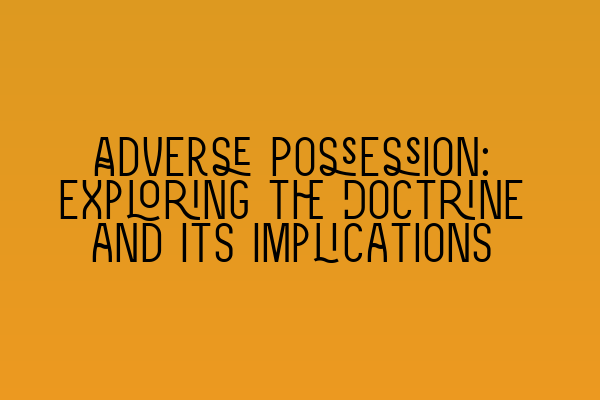Adverse Possession: Exploring the Doctrine and Its Implications
Welcome to the SQE Property Law & Land Law blog! In today’s post, we will be diving into the fascinating topic of adverse possession and exploring the doctrine and its implications in property law. Whether you are a law student preparing for the SQE exams or a legal professional looking to enhance your knowledge, this article will provide you with a comprehensive understanding of adverse possession.
What is Adverse Possession?
Adverse possession is a legal principle that allows a person to acquire ownership rights of a property by occupying and using it as their own for a certain period of time, typically ranging from 10 to 20 years, depending on the applicable jurisdiction. This doctrine is based on the idea that if a property owner neglects their property rights for an extended period of time, someone else should be allowed to claim possession.
Requirements for Adverse Possession
To successfully claim adverse possession, certain requirements must be met. These requirements can vary depending on the jurisdiction, but there are generally four broad elements:
1. Actual Possession: The claimant must physically occupy the property and treat it as their own. Mere intention or occasional use is not sufficient.
2. Open and Notorious: The possession must be open, visible, and obvious to the true owner of the property. This requirement ensures that the true owner has a reasonable opportunity to become aware of the adverse possession.
3. Exclusive Possession: The claimant must possess the property to the exclusion of all others, including the true owner. Sharing possession with the true owner or other third parties can undermine the adverse possession claim.
4. Continuous Possession: The claimant’s possession must be continuous over the required period of time. Short periods of abandonment or temporarily leaving the property may not break the continuity, but it is essential to demonstrate a genuine intention to possess.
Implications of Adverse Possession
Adverse possession can have significant implications for property owners and those seeking to acquire property through the legal system. Understanding these implications is crucial for both property lawyers and anyone involved in property transactions.
1. Loss of Title: If a person successfully claims adverse possession, the true owner may lose their title to the property. This can be a major concern for property owners and highlights the importance of properly maintaining and protecting their property interests.
2. Defending Against Adverse Possession Claims: Property owners who become aware of adverse possession claims must take prompt action to protect their interests. They can challenge the claim by proving that the requirements for adverse possession are not met, such as by demonstrating that the possession was permissive rather than adverse.
3. Limitation Periods: Adverse possession claims are subject to limitation periods, which restrict the time within which a claimant can assert adverse possession. Understanding these limitation periods is essential for both claimants and defenders in adverse possession cases.
4. Land Registration Systems: In jurisdictions with a land registration system, the registration of adverse possession can be complex. The land registry may require evidence of long and continuous possession before transferring ownership to the adverse possessor.
5. Legal and Practical Considerations: Adverse possession cases often involve complex legal and factual issues. They require careful analysis of evidence, documentation, and legal arguments, making it essential to seek legal advice from experienced property lawyers.
Preparing for the SQE Exams
If you are a law student preparing for the SQE exams, understanding adverse possession is crucial. It is a topic commonly tested in property law exams, so make sure to study the requirements, implications, and relevant case law. To further enhance your preparation, consider taking advantage of SQE 1 Practice Exam Questions and SQE 1 Practice Mocks FLK1 FLK2 courses offered by our partner, FQPS. These resources will help strengthen your knowledge and boost your confidence for the exams.
Stay Informed with SQE Property Law & Land Law
To stay up-to-date with the latest developments in property law and land law, be sure to follow our blog. We regularly publish informative articles on topics relevant to the SQE exams and the legal profession as a whole. For more information on SQE 1 and SQE 2 preparation courses, you can check out FQPS’s SQE 1 Preparation Courses and SQE 2 Preparation Courses.
Lastly, if you are looking for information on SRA SQE exam dates, visit our article on SRA SQE Exam Dates for the most up-to-date information on exam schedules and registration deadlines.
Thank you for reading this comprehensive blog post on adverse possession. We hope it has provided you with valuable insights into this intriguing area of property law. Should you have any further questions or require legal advice, do not hesitate to reach out to SQE Property Law & Land Law.
